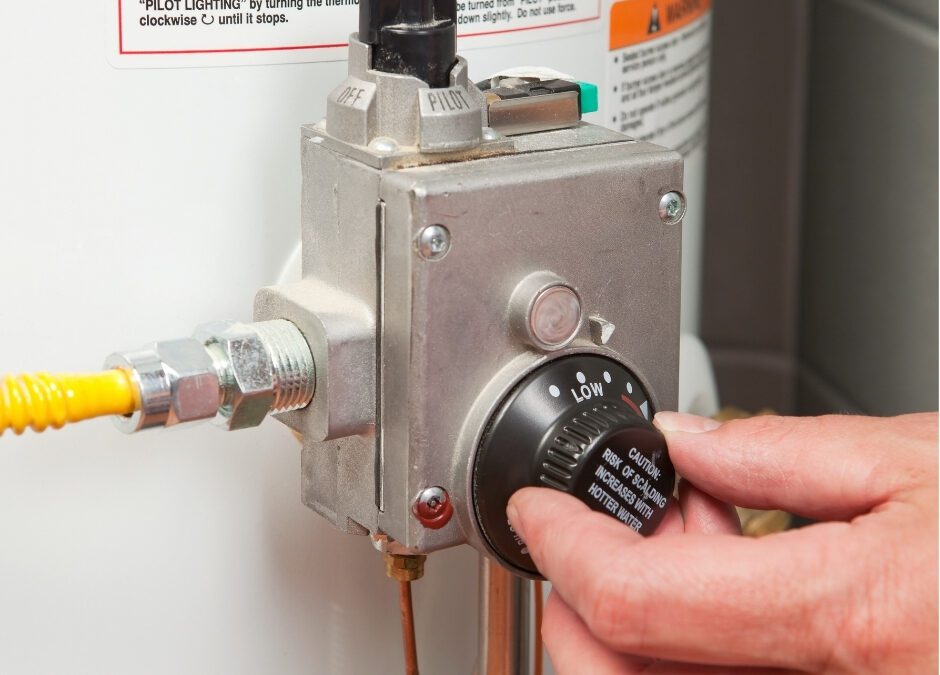Naturally, many homeowners wonder, “How long does it take for a water heater to heat up?” It’s a question that impacts more than just convenience—it affects your energy efficiency, monthly utility bills, and overall home comfort. Your water heater plays a significant role in your daily comfort, whether it provides enough hot water for back-to-back showers or allows you to run the dishwasher and do laundry simultaneously.
Typically, a gas water heater takes about 20-30 minutes, while an electric water heater can take 1-2 hours. However, these times can vary based on several factors, including the type of water heater, tank size, and the initial water temperature. Continue reading to learn more about what affects water heater heating times and how you can ensure your water heater is operating efficiently.
Key Takeaways
- Heating time for water heaters varies by type: gas models can heat water in 20-30 minutes, while electric models may take 1-2 hours.
- Tank size and initial water temperature significantly influence heating times; larger tanks and colder incoming water require more time to reach the desired temperature.
- Routine water heater maintenance, which includes flushing the tank, inspecting the anode rod, pressure relief valve, and checking thermostat settings, is crucial for optimizing water heater efficiency and preventing common issues that slow down heating.
Factors Affecting Heating Time
The time it takes for a water heater to heat up can vary significantly based on several key factors:
- The type of heater you have, whether it’s gas, electric, or hybrid, plays a significant role.
- Gas water heaters generally heat water faster, often within 20 to 30 minutes, thanks to their higher energy output.
- Electric water heaters can take anywhere from 1 to 2 hours to heat a full tank.
Additionally, the size of the tank and the initial temperature of the incoming water can greatly influence heating times. Larger tanks, such as an 80-gallon model, will naturally require more time to heat up compared to smaller tanks. Cold water supply temperatures, influenced by geographical location and seasonal fluctuations, can also affect how quickly your water heater reaches the desired temperature.
Typical Heating Times for Different Water Heaters
When considering water heater maintenance, it’s essential to understand the typical heating times for different types of water heaters. This knowledge can help set realistic expectations and identify potential issues. Let’s explore the typical heating times for electric, gas, and tankless water heaters, which can vary by the hour.
Electric Water Heaters
Electric water heaters are often slower to heat due to their lower energy efficiency compared to gas models. Typically, an electric water heater requires approximately 60 to 80 minutes to heat a standard 40-gallon tank, making it less ideal for households that need a quick hot water supply.
Although electric models heat water more slowly, they can be more efficient in specific scenarios. Maintaining your water heater by having a plumber inspect the heating elements and verify that the circuit breaker is functioning correctly can optimize performance and prevent unexpected cold showers. Additionally, understanding the role of electricity in your water heater’s operation can enhance overall efficiency.
Gas Water Heaters
Gas water heaters are known for their ability to heat water quickly due to their higher energy output. These heaters typically heat water in about 30 to 40 minutes, which is significantly faster than electric models. Making them a popular choice for households with high hot water demand.
Routine water heater maintenance is crucial for the efficient operation of a gas water heater. We recommend having a professional regularly inspect the drain valve for leaks, verify the thermostat setting to ensure it’s adjusted correctly, and maintain quick heating times.
Tankless Water Heaters
Tankless water heaters offer a modern solution to the hot water question. By heating water on demand, they eliminate the need for a storage tank and provide hot water almost instantly. Typically, tankless water heaters can deliver hot water within 10 to 20 seconds, ensuring you never have to wait long for a warm shower.
Optimal performance of tankless water heaters relies on regular maintenance. Flushing the system to remove sediment and ensuring the heating elements are in good condition allows your unit to run efficiently.
Initial Water Temperature
The initial temperature of the incoming water plays a significant role in determining how long it takes for your water heater to reach the desired temperature. If the cold-water supply is particularly cold, the heater will need more time to warm it up. This can be especially noticeable during the winter months, when the initial water temperature is significantly lower.
A drop in initial water temperature significantly increases heating time. Take into consideration your geographic location and any seasonal changes when evaluating performance and adjust your thermostat accordingly to compensate for these variations.
Tank Size and Capacity
The size of your water heater tank directly affects how long it takes to heat the water. Larger tanks, which hold more water, naturally take longer to heat up compared to smaller tanks. For instance, an 80-gallon electric water heater can take approximately 2 hours to heat thoroughly.
Consider household size and hot water needs when choosing a new water heater. Typically, an 80-gallon tank suits three to four people, while a smaller tank works for one to two individuals, balancing hot water availability with heating times.
Heating Elements and Efficiency
The efficiency of your water heater’s heating elements plays a crucial role in how quickly it can heat water. Factors such as sediment accumulation can insulate the heating element, making it less effective and resulting in longer heating times. Routine water heater maintenance, which includes flushing the tank to remove sediment, can help maintain the efficiency of these elements.
Lower initial water temperatures decrease efficiency and extend heating times. Well-maintained water heaters with good heating elements significantly improve performance and heating speed.
Importance of Thermostat Settings
Thermostat settings critically impact water heater performance. An overly high setting can produce excessive hot water, resulting in inefficiency and potential safety hazards. Adjust the thermostat to a suitable setting for enhanced efficiency and safety.
A malfunctioning thermostat can also prevent the water heater from reaching the desired temperature, resulting in extended heating times. Properly insulating hot water pipes can further minimize heat loss, ensuring that the hot water reaches your taps more efficiently.
Routine Maintenance for Optimal Performance
Keep your water heater in optimal condition through regular maintenance by:
- Flushing the tank annually to remove sediment
- Checking for rust or corrosion
- Testing the temperature and pressure relief valve to ensure safety and performance.
Setting the thermostat at 120ºF can help prevent mineral buildup and reduce energy costs associated with standby heat loss. By focusing on routine maintenance, you can ensure your water heater operates efficiently and has a longer lifespan.
Common Problems That Slow Down Heating
Common problems, such as sediment buildup and faulty heating elements, can significantly slow down heating times. Sediment accumulation in the tank can insulate the heating element, reducing its effectiveness. Regularly flushing the tank can help mitigate this issue and maintain efficient heating.
In electric water heaters, burnt-out heating elements can also lead to slower heating times. Additionally, a faulty thermostat may prevent the water heater from reaching the set temperature, which can affect its overall performance. Routine maintenance to address common problems ensures optimal heating times.
Professional Plumbing Help & When to Seek It
Some signs that indicate the need for professional attention include persistent leaks, inconsistent hot water, and unusual noises. Ignoring these problems can lead to higher repair costs or even necessitate a complete replacement.
Smoak’s Comfort Control offers water heater repair, installation, and maintenance services for a variety of water heater types. Straightforward and competitive pricing, along with honest assessments, make them a reliable choice for hiring to address any water heater issues.
Smoak’s Comfort Control Services
Smoak’s Comfort Control prioritizes customer satisfaction through efficient service and expert repairs. Their plumbers focus on professionalism and thorough communication during service calls, ensuring that customers can confirm open consultations well-informed about the cost and connection throughout the power center review process. This is crucial, as it helps avoid any disconnect in their position to prevent issues before they arise. This is a test of their commitment to quality.
With a 100% satisfaction guarantee on all their products, services, and workmanship, Smoak’s Comfort Control provides homeowners with peace of mind. Whether you need a routine maintenance check or a complete water heater replacement, they have the expertise to get the job done quickly and effectively.
Contact us today to schedule an appointment or request more information!
Summary
Understanding how long it takes for a water heater to heat up and the factors that influence this process can help you maintain an efficient and reliable system. Key factors include the type of water heater, tank size, initial water temperature, and routine maintenance.
By following water heater maintenance tips and knowing when to seek professional help, you can ensure your water heater operates at peak performance. Trusting experts like Smoak’s Comfort Control can provide the peace of mind that your home’s hot water needs are in good hands.
Frequently Asked Questions
How long does it take for an electric water heater to heat up?
An electric water heater generally takes 60 to 80 minutes to heat a standard 40-gallon tank. Therefore, you can expect to have hot water ready in approximately one hour.
What should I do if my water heater is making unusual noises?
If your water heater is making unusual noises, it’s essential to consult a professional to diagnose and resolve the issue promptly. Addressing it early can prevent further complications.
How often should I flush my water heater tank?
Flushing your water heater tank at least once a year is essential to remove sediment buildup and ensure optimal efficiency. Regular maintenance helps prolong the lifespan of your water heater.
What are the benefits of a tankless water heater?
A tankless water heater offers the advantage of providing hot water on demand, eliminating the wait associated with traditional storage tanks. This efficiency not only conserves energy but also saves space and reduces the risk of running out of hot water during peak usage times.
When should I seek professional help for my water heater?
Seek the assistance of a professional plumber if you experience persistent leaks, inconsistent hot water, or unusual noises, as these can indicate underlying issues that require attention.

